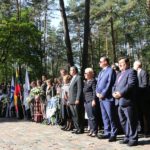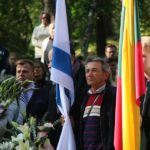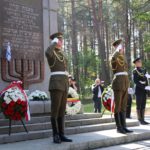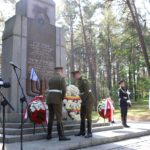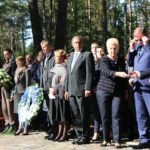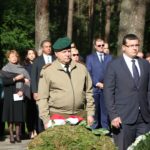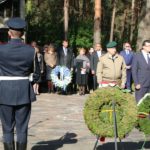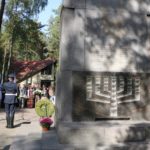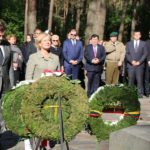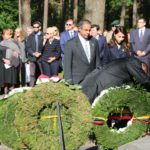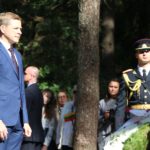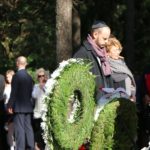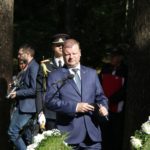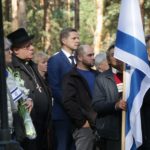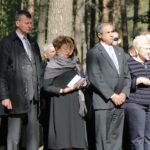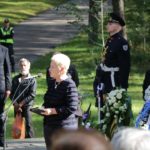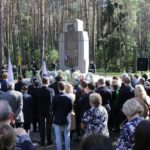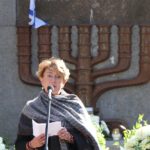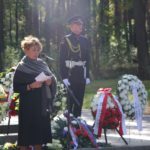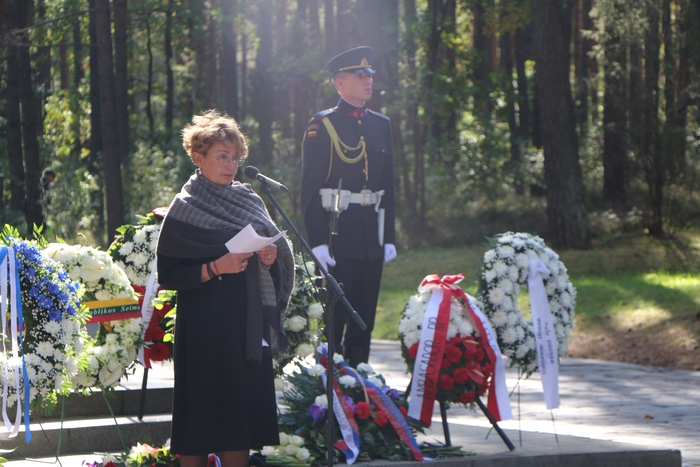
At 1:00 P.M. on September 26 the public gathered at the main monument at the Ponar Memorial Complex to mark the Lithuanian Day of Remembrance of Jewish Victims of Genocide. The day is marked on September 23, the anniversary of the liquidation of the Vilnius ghetto, but the 23rd fell on a Saturday this year.
Boris Traub began the commemoration with a violin solo, followed by several young girls who read heart-wrenching Holocaust poetry in Lithuanian. Next Lithuanian prime minister Saulius Skvernelis spoke, pledging the Lithuanian people would never forget the Holocaust. This was followed by the laying of wreaths, first using an honor guard in the name of Lithuanian president Dalia Grybauskaitė. The Lithuanian Ministry of Culture also laid a wreath, as did Vilnius mayor Remigijus Šimašius and by Ronaldas Račinskas personally, the executive director of the International Commission to Assess the Crimes of the Soviet and Nazi Occupational Regimes in Lithuania. Foreign embassies and the Lithuanian Jewish Community, the Vilna Gaon State Jewish Museum and others also laid wreaths at the base of the monument in Ponar. The medium-sized parking lot at the memorial complex was almost filled with automobiles bearing diplomatic license plates. Some sported national flags, including those of Estonia, the Czech Republic and the Russian Federation.
Israeli ambassador to Lithuania Amir Maimon spoke with a very soft musical accompaniment in the background and reiterated the victims had names, and are not a statistic.
Former speaker of parliament Conservative Party MP Irena Degutienė spoke and said the current generation of young Lithuanians know much more about the Holocaust than her generation ever learned.
Lithuanian Jewish MP Emanuelis Zingeris delivered perhaps the most carefully worded speech of the day, praised the grass-roots movement to read out the names of the victims in Lithuania over the past several years and called upon Lithuanian politicians to remove the names of Holocaust perpetrators from the official names of parks, streets and public spaces.
Lithuanian Jewish Community chairwoman Faina Kukliansky spoke briefly, then delivered a message in Yiddish from Fania Brancovskaja, the Jewish partisan veteran, who Kukliansky said was unable to attend the ceremony that day. She also called upon Mickey Kantor, chairwoman of the Association of Vilna Jews in Israel, to speak, which she did. This was followed by a solo performance by opera singer Rafailas Karpis, then songs by Lithuanian schoolchildren.
The event was attended by members and staff of the Lithuanian Jewish Community, staff of the Vilna Gaon Jewish State Museum, chairmen from regional Jewish communities, members of the public and students and staff from the ORT Sholem Aleichem Vilnius Gymnasium, including principal Miša Jakobas, among others. A local Hassidic group discretely passed out their Jewish calendar for 5778 and just as discretely invited Jews to don tefellin and pray. The heavy presence of embassy vehicles wasn’t indicative of a very humble presence at the ceremony by embassy officials and the general tone of the entire event was very subdued to the point of being funereal and in good taste with respect to the nature of the commemoration.
Photos by Dovilė Abromavičiūtė






